The Role of Communication Skills in Field of Management
VerifiedAdded on 2022/11/04
|6
|1810
|470
Essay
AI Summary
This essay examines the critical role of communication skills in the field of management. It emphasizes that effective communication is essential for various management functions, including strategy development, goal achievement, and human resource management. The essay highlights three key interpersonal communication skills: listening, feedback, and questioning, and provides detailed explanations of each. It emphasizes the importance of active listening, providing constructive and positive feedback, and asking well-structured questions to gather information and clarify ideas. The essay also discusses the benefits of these skills, such as improved employee relations, increased client satisfaction, and the development of effective leadership. The author concludes that organizations should invest in training to develop these crucial interpersonal skills among employees and leaders, stressing the importance of a gentle, respectful, and active communication approach.
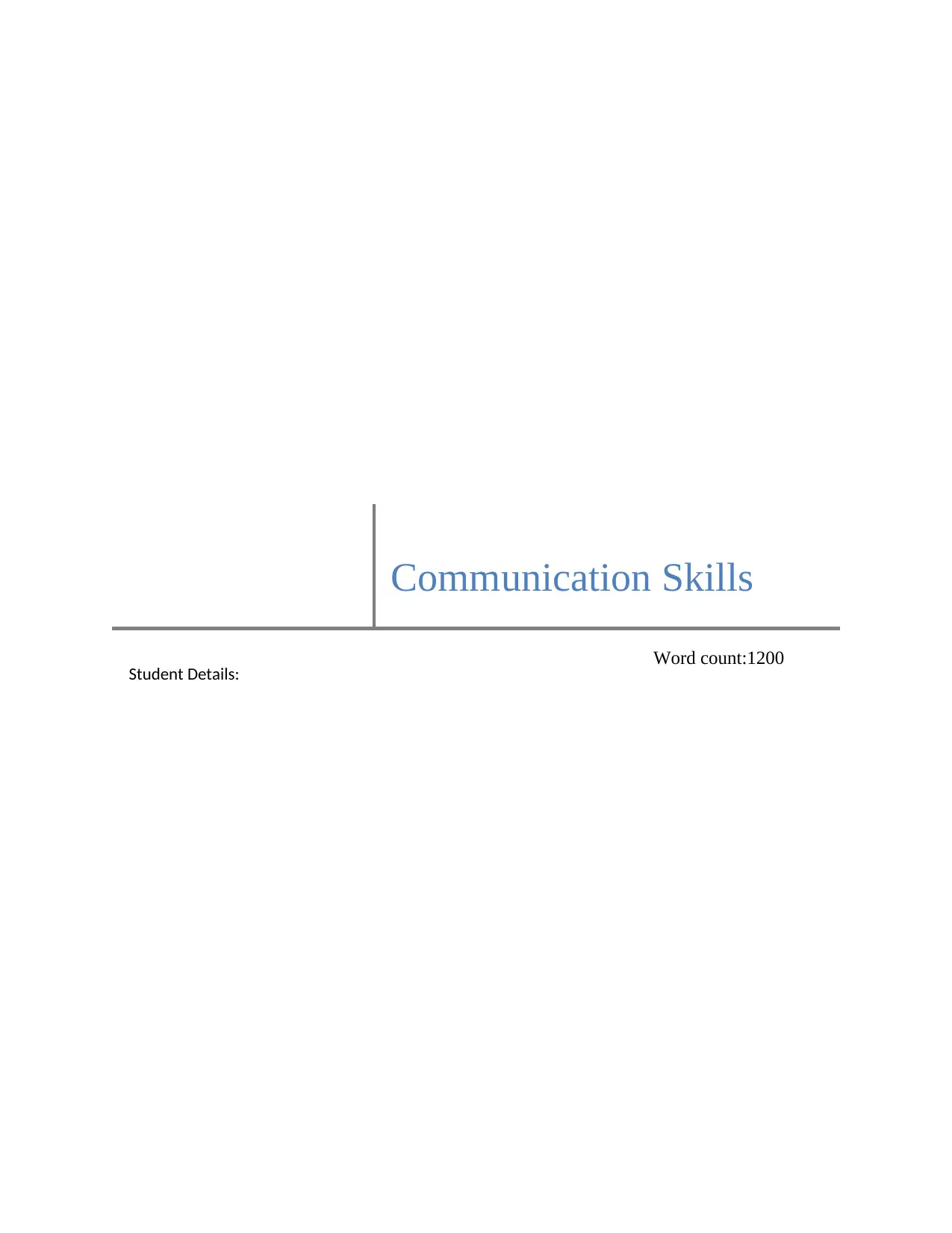
Communication Skills
Student Details: Word count:1200
Student Details: Word count:1200
Paraphrase This Document
Need a fresh take? Get an instant paraphrase of this document with our AI Paraphraser
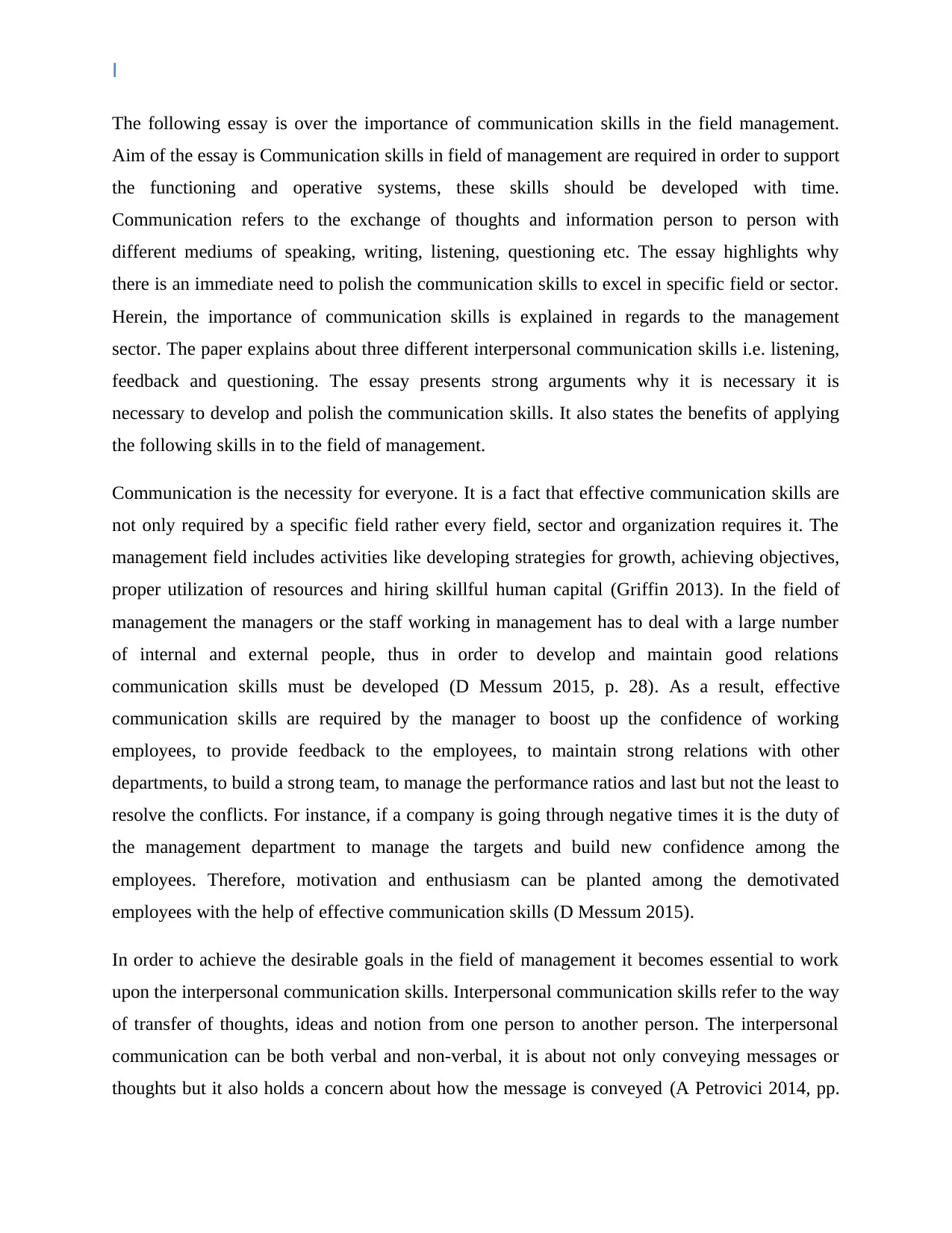
I
The following essay is over the importance of communication skills in the field management.
Aim of the essay is Communication skills in field of management are required in order to support
the functioning and operative systems, these skills should be developed with time.
Communication refers to the exchange of thoughts and information person to person with
different mediums of speaking, writing, listening, questioning etc. The essay highlights why
there is an immediate need to polish the communication skills to excel in specific field or sector.
Herein, the importance of communication skills is explained in regards to the management
sector. The paper explains about three different interpersonal communication skills i.e. listening,
feedback and questioning. The essay presents strong arguments why it is necessary it is
necessary to develop and polish the communication skills. It also states the benefits of applying
the following skills in to the field of management.
Communication is the necessity for everyone. It is a fact that effective communication skills are
not only required by a specific field rather every field, sector and organization requires it. The
management field includes activities like developing strategies for growth, achieving objectives,
proper utilization of resources and hiring skillful human capital (Griffin 2013). In the field of
management the managers or the staff working in management has to deal with a large number
of internal and external people, thus in order to develop and maintain good relations
communication skills must be developed (D Messum 2015, p. 28). As a result, effective
communication skills are required by the manager to boost up the confidence of working
employees, to provide feedback to the employees, to maintain strong relations with other
departments, to build a strong team, to manage the performance ratios and last but not the least to
resolve the conflicts. For instance, if a company is going through negative times it is the duty of
the management department to manage the targets and build new confidence among the
employees. Therefore, motivation and enthusiasm can be planted among the demotivated
employees with the help of effective communication skills (D Messum 2015).
In order to achieve the desirable goals in the field of management it becomes essential to work
upon the interpersonal communication skills. Interpersonal communication skills refer to the way
of transfer of thoughts, ideas and notion from one person to another person. The interpersonal
communication can be both verbal and non-verbal, it is about not only conveying messages or
thoughts but it also holds a concern about how the message is conveyed (A Petrovici 2014, pp.
The following essay is over the importance of communication skills in the field management.
Aim of the essay is Communication skills in field of management are required in order to support
the functioning and operative systems, these skills should be developed with time.
Communication refers to the exchange of thoughts and information person to person with
different mediums of speaking, writing, listening, questioning etc. The essay highlights why
there is an immediate need to polish the communication skills to excel in specific field or sector.
Herein, the importance of communication skills is explained in regards to the management
sector. The paper explains about three different interpersonal communication skills i.e. listening,
feedback and questioning. The essay presents strong arguments why it is necessary it is
necessary to develop and polish the communication skills. It also states the benefits of applying
the following skills in to the field of management.
Communication is the necessity for everyone. It is a fact that effective communication skills are
not only required by a specific field rather every field, sector and organization requires it. The
management field includes activities like developing strategies for growth, achieving objectives,
proper utilization of resources and hiring skillful human capital (Griffin 2013). In the field of
management the managers or the staff working in management has to deal with a large number
of internal and external people, thus in order to develop and maintain good relations
communication skills must be developed (D Messum 2015, p. 28). As a result, effective
communication skills are required by the manager to boost up the confidence of working
employees, to provide feedback to the employees, to maintain strong relations with other
departments, to build a strong team, to manage the performance ratios and last but not the least to
resolve the conflicts. For instance, if a company is going through negative times it is the duty of
the management department to manage the targets and build new confidence among the
employees. Therefore, motivation and enthusiasm can be planted among the demotivated
employees with the help of effective communication skills (D Messum 2015).
In order to achieve the desirable goals in the field of management it becomes essential to work
upon the interpersonal communication skills. Interpersonal communication skills refer to the way
of transfer of thoughts, ideas and notion from one person to another person. The interpersonal
communication can be both verbal and non-verbal, it is about not only conveying messages or
thoughts but it also holds a concern about how the message is conveyed (A Petrovici 2014, pp.
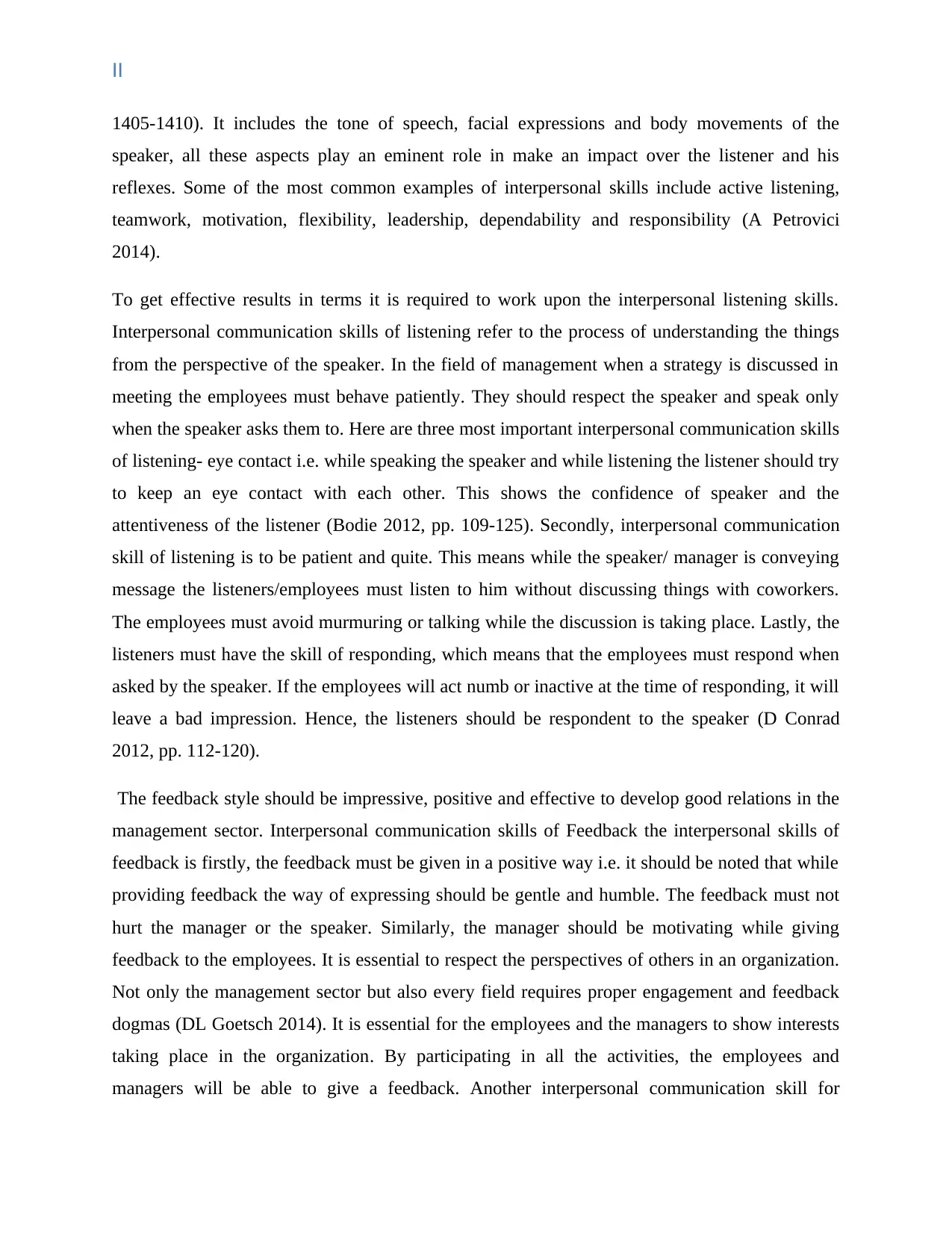
II
1405-1410). It includes the tone of speech, facial expressions and body movements of the
speaker, all these aspects play an eminent role in make an impact over the listener and his
reflexes. Some of the most common examples of interpersonal skills include active listening,
teamwork, motivation, flexibility, leadership, dependability and responsibility (A Petrovici
2014).
To get effective results in terms it is required to work upon the interpersonal listening skills.
Interpersonal communication skills of listening refer to the process of understanding the things
from the perspective of the speaker. In the field of management when a strategy is discussed in
meeting the employees must behave patiently. They should respect the speaker and speak only
when the speaker asks them to. Here are three most important interpersonal communication skills
of listening- eye contact i.e. while speaking the speaker and while listening the listener should try
to keep an eye contact with each other. This shows the confidence of speaker and the
attentiveness of the listener (Bodie 2012, pp. 109-125). Secondly, interpersonal communication
skill of listening is to be patient and quite. This means while the speaker/ manager is conveying
message the listeners/employees must listen to him without discussing things with coworkers.
The employees must avoid murmuring or talking while the discussion is taking place. Lastly, the
listeners must have the skill of responding, which means that the employees must respond when
asked by the speaker. If the employees will act numb or inactive at the time of responding, it will
leave a bad impression. Hence, the listeners should be respondent to the speaker (D Conrad
2012, pp. 112-120).
The feedback style should be impressive, positive and effective to develop good relations in the
management sector. Interpersonal communication skills of Feedback the interpersonal skills of
feedback is firstly, the feedback must be given in a positive way i.e. it should be noted that while
providing feedback the way of expressing should be gentle and humble. The feedback must not
hurt the manager or the speaker. Similarly, the manager should be motivating while giving
feedback to the employees. It is essential to respect the perspectives of others in an organization.
Not only the management sector but also every field requires proper engagement and feedback
dogmas (DL Goetsch 2014). It is essential for the employees and the managers to show interests
taking place in the organization. By participating in all the activities, the employees and
managers will be able to give a feedback. Another interpersonal communication skill for
1405-1410). It includes the tone of speech, facial expressions and body movements of the
speaker, all these aspects play an eminent role in make an impact over the listener and his
reflexes. Some of the most common examples of interpersonal skills include active listening,
teamwork, motivation, flexibility, leadership, dependability and responsibility (A Petrovici
2014).
To get effective results in terms it is required to work upon the interpersonal listening skills.
Interpersonal communication skills of listening refer to the process of understanding the things
from the perspective of the speaker. In the field of management when a strategy is discussed in
meeting the employees must behave patiently. They should respect the speaker and speak only
when the speaker asks them to. Here are three most important interpersonal communication skills
of listening- eye contact i.e. while speaking the speaker and while listening the listener should try
to keep an eye contact with each other. This shows the confidence of speaker and the
attentiveness of the listener (Bodie 2012, pp. 109-125). Secondly, interpersonal communication
skill of listening is to be patient and quite. This means while the speaker/ manager is conveying
message the listeners/employees must listen to him without discussing things with coworkers.
The employees must avoid murmuring or talking while the discussion is taking place. Lastly, the
listeners must have the skill of responding, which means that the employees must respond when
asked by the speaker. If the employees will act numb or inactive at the time of responding, it will
leave a bad impression. Hence, the listeners should be respondent to the speaker (D Conrad
2012, pp. 112-120).
The feedback style should be impressive, positive and effective to develop good relations in the
management sector. Interpersonal communication skills of Feedback the interpersonal skills of
feedback is firstly, the feedback must be given in a positive way i.e. it should be noted that while
providing feedback the way of expressing should be gentle and humble. The feedback must not
hurt the manager or the speaker. Similarly, the manager should be motivating while giving
feedback to the employees. It is essential to respect the perspectives of others in an organization.
Not only the management sector but also every field requires proper engagement and feedback
dogmas (DL Goetsch 2014). It is essential for the employees and the managers to show interests
taking place in the organization. By participating in all the activities, the employees and
managers will be able to give a feedback. Another interpersonal communication skill for
⊘ This is a preview!⊘
Do you want full access?
Subscribe today to unlock all pages.

Trusted by 1+ million students worldwide
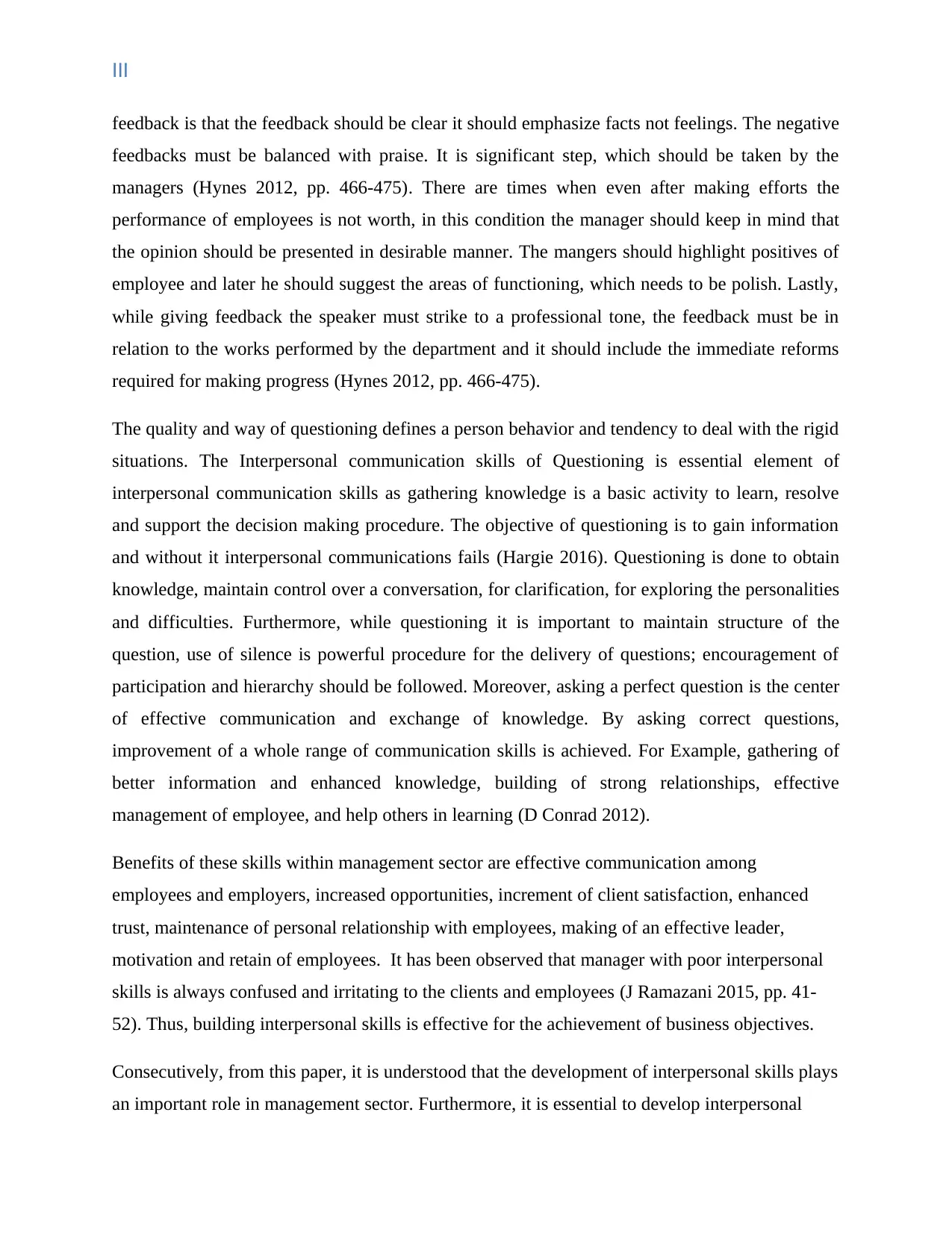
III
feedback is that the feedback should be clear it should emphasize facts not feelings. The negative
feedbacks must be balanced with praise. It is significant step, which should be taken by the
managers (Hynes 2012, pp. 466-475). There are times when even after making efforts the
performance of employees is not worth, in this condition the manager should keep in mind that
the opinion should be presented in desirable manner. The mangers should highlight positives of
employee and later he should suggest the areas of functioning, which needs to be polish. Lastly,
while giving feedback the speaker must strike to a professional tone, the feedback must be in
relation to the works performed by the department and it should include the immediate reforms
required for making progress (Hynes 2012, pp. 466-475).
The quality and way of questioning defines a person behavior and tendency to deal with the rigid
situations. The Interpersonal communication skills of Questioning is essential element of
interpersonal communication skills as gathering knowledge is a basic activity to learn, resolve
and support the decision making procedure. The objective of questioning is to gain information
and without it interpersonal communications fails (Hargie 2016). Questioning is done to obtain
knowledge, maintain control over a conversation, for clarification, for exploring the personalities
and difficulties. Furthermore, while questioning it is important to maintain structure of the
question, use of silence is powerful procedure for the delivery of questions; encouragement of
participation and hierarchy should be followed. Moreover, asking a perfect question is the center
of effective communication and exchange of knowledge. By asking correct questions,
improvement of a whole range of communication skills is achieved. For Example, gathering of
better information and enhanced knowledge, building of strong relationships, effective
management of employee, and help others in learning (D Conrad 2012).
Benefits of these skills within management sector are effective communication among
employees and employers, increased opportunities, increment of client satisfaction, enhanced
trust, maintenance of personal relationship with employees, making of an effective leader,
motivation and retain of employees. It has been observed that manager with poor interpersonal
skills is always confused and irritating to the clients and employees (J Ramazani 2015, pp. 41-
52). Thus, building interpersonal skills is effective for the achievement of business objectives.
Consecutively, from this paper, it is understood that the development of interpersonal skills plays
an important role in management sector. Furthermore, it is essential to develop interpersonal
feedback is that the feedback should be clear it should emphasize facts not feelings. The negative
feedbacks must be balanced with praise. It is significant step, which should be taken by the
managers (Hynes 2012, pp. 466-475). There are times when even after making efforts the
performance of employees is not worth, in this condition the manager should keep in mind that
the opinion should be presented in desirable manner. The mangers should highlight positives of
employee and later he should suggest the areas of functioning, which needs to be polish. Lastly,
while giving feedback the speaker must strike to a professional tone, the feedback must be in
relation to the works performed by the department and it should include the immediate reforms
required for making progress (Hynes 2012, pp. 466-475).
The quality and way of questioning defines a person behavior and tendency to deal with the rigid
situations. The Interpersonal communication skills of Questioning is essential element of
interpersonal communication skills as gathering knowledge is a basic activity to learn, resolve
and support the decision making procedure. The objective of questioning is to gain information
and without it interpersonal communications fails (Hargie 2016). Questioning is done to obtain
knowledge, maintain control over a conversation, for clarification, for exploring the personalities
and difficulties. Furthermore, while questioning it is important to maintain structure of the
question, use of silence is powerful procedure for the delivery of questions; encouragement of
participation and hierarchy should be followed. Moreover, asking a perfect question is the center
of effective communication and exchange of knowledge. By asking correct questions,
improvement of a whole range of communication skills is achieved. For Example, gathering of
better information and enhanced knowledge, building of strong relationships, effective
management of employee, and help others in learning (D Conrad 2012).
Benefits of these skills within management sector are effective communication among
employees and employers, increased opportunities, increment of client satisfaction, enhanced
trust, maintenance of personal relationship with employees, making of an effective leader,
motivation and retain of employees. It has been observed that manager with poor interpersonal
skills is always confused and irritating to the clients and employees (J Ramazani 2015, pp. 41-
52). Thus, building interpersonal skills is effective for the achievement of business objectives.
Consecutively, from this paper, it is understood that the development of interpersonal skills plays
an important role in management sector. Furthermore, it is essential to develop interpersonal
Paraphrase This Document
Need a fresh take? Get an instant paraphrase of this document with our AI Paraphraser
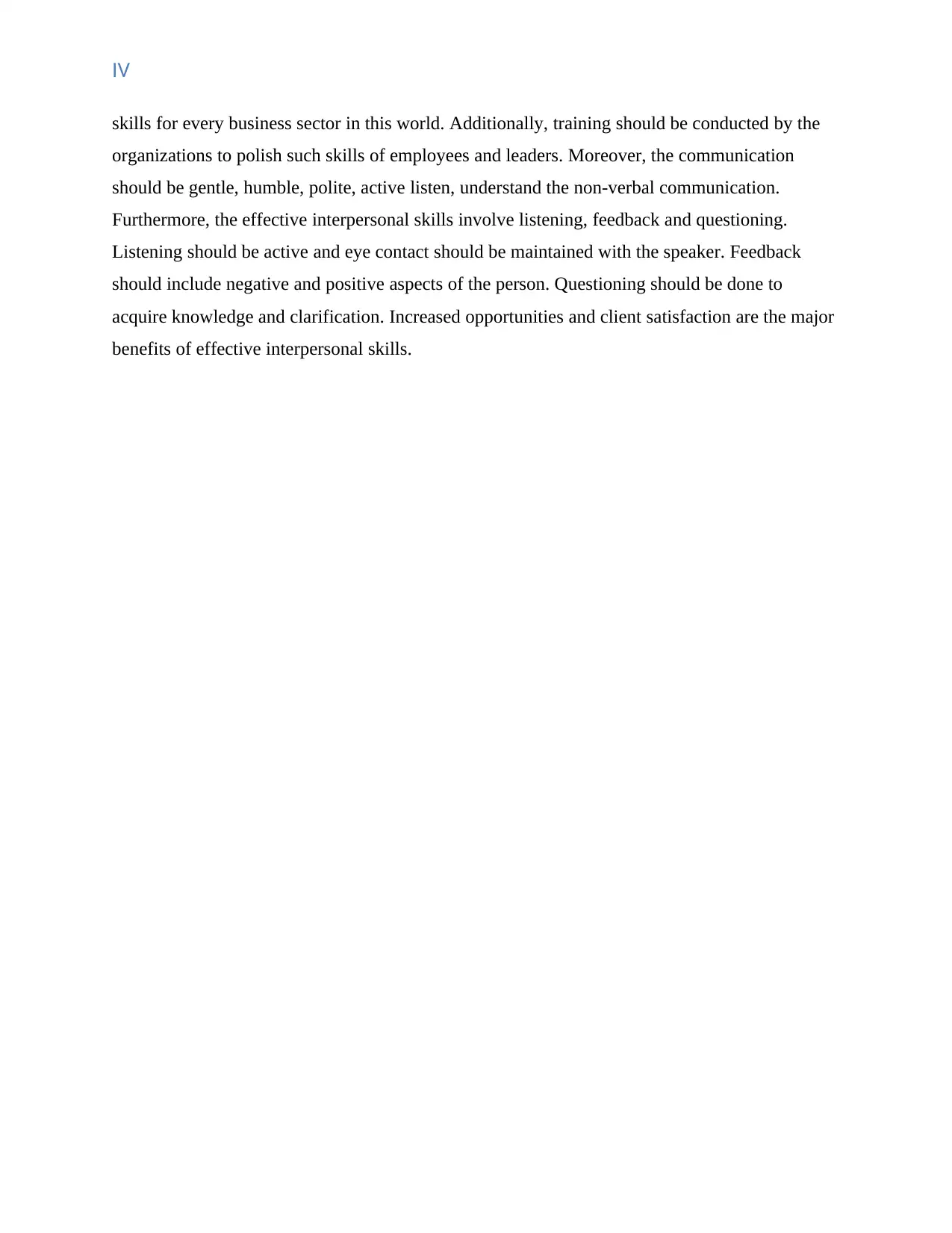
IV
skills for every business sector in this world. Additionally, training should be conducted by the
organizations to polish such skills of employees and leaders. Moreover, the communication
should be gentle, humble, polite, active listen, understand the non-verbal communication.
Furthermore, the effective interpersonal skills involve listening, feedback and questioning.
Listening should be active and eye contact should be maintained with the speaker. Feedback
should include negative and positive aspects of the person. Questioning should be done to
acquire knowledge and clarification. Increased opportunities and client satisfaction are the major
benefits of effective interpersonal skills.
skills for every business sector in this world. Additionally, training should be conducted by the
organizations to polish such skills of employees and leaders. Moreover, the communication
should be gentle, humble, polite, active listen, understand the non-verbal communication.
Furthermore, the effective interpersonal skills involve listening, feedback and questioning.
Listening should be active and eye contact should be maintained with the speaker. Feedback
should include negative and positive aspects of the person. Questioning should be done to
acquire knowledge and clarification. Increased opportunities and client satisfaction are the major
benefits of effective interpersonal skills.
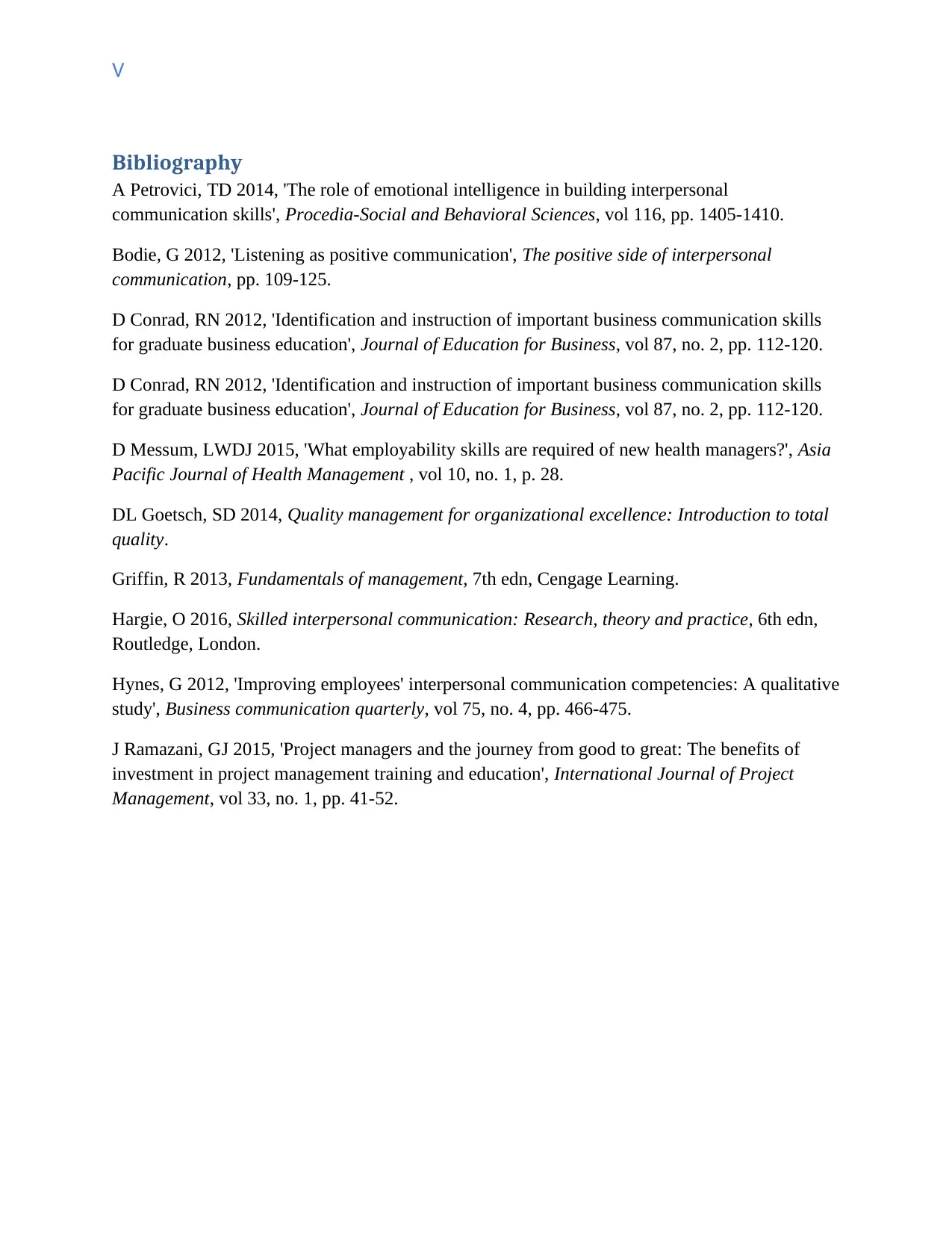
V
Bibliography
A Petrovici, TD 2014, 'The role of emotional intelligence in building interpersonal
communication skills', Procedia-Social and Behavioral Sciences, vol 116, pp. 1405-1410.
Bodie, G 2012, 'Listening as positive communication', The positive side of interpersonal
communication, pp. 109-125.
D Conrad, RN 2012, 'Identification and instruction of important business communication skills
for graduate business education', Journal of Education for Business, vol 87, no. 2, pp. 112-120.
D Conrad, RN 2012, 'Identification and instruction of important business communication skills
for graduate business education', Journal of Education for Business, vol 87, no. 2, pp. 112-120.
D Messum, LWDJ 2015, 'What employability skills are required of new health managers?', Asia
Pacific Journal of Health Management , vol 10, no. 1, p. 28.
DL Goetsch, SD 2014, Quality management for organizational excellence: Introduction to total
quality.
Griffin, R 2013, Fundamentals of management, 7th edn, Cengage Learning.
Hargie, O 2016, Skilled interpersonal communication: Research, theory and practice, 6th edn,
Routledge, London.
Hynes, G 2012, 'Improving employees' interpersonal communication competencies: A qualitative
study', Business communication quarterly, vol 75, no. 4, pp. 466-475.
J Ramazani, GJ 2015, 'Project managers and the journey from good to great: The benefits of
investment in project management training and education', International Journal of Project
Management, vol 33, no. 1, pp. 41-52.
Bibliography
A Petrovici, TD 2014, 'The role of emotional intelligence in building interpersonal
communication skills', Procedia-Social and Behavioral Sciences, vol 116, pp. 1405-1410.
Bodie, G 2012, 'Listening as positive communication', The positive side of interpersonal
communication, pp. 109-125.
D Conrad, RN 2012, 'Identification and instruction of important business communication skills
for graduate business education', Journal of Education for Business, vol 87, no. 2, pp. 112-120.
D Conrad, RN 2012, 'Identification and instruction of important business communication skills
for graduate business education', Journal of Education for Business, vol 87, no. 2, pp. 112-120.
D Messum, LWDJ 2015, 'What employability skills are required of new health managers?', Asia
Pacific Journal of Health Management , vol 10, no. 1, p. 28.
DL Goetsch, SD 2014, Quality management for organizational excellence: Introduction to total
quality.
Griffin, R 2013, Fundamentals of management, 7th edn, Cengage Learning.
Hargie, O 2016, Skilled interpersonal communication: Research, theory and practice, 6th edn,
Routledge, London.
Hynes, G 2012, 'Improving employees' interpersonal communication competencies: A qualitative
study', Business communication quarterly, vol 75, no. 4, pp. 466-475.
J Ramazani, GJ 2015, 'Project managers and the journey from good to great: The benefits of
investment in project management training and education', International Journal of Project
Management, vol 33, no. 1, pp. 41-52.
⊘ This is a preview!⊘
Do you want full access?
Subscribe today to unlock all pages.

Trusted by 1+ million students worldwide
1 out of 6
Related Documents
Your All-in-One AI-Powered Toolkit for Academic Success.
+13062052269
info@desklib.com
Available 24*7 on WhatsApp / Email
![[object Object]](/_next/static/media/star-bottom.7253800d.svg)
Unlock your academic potential
Copyright © 2020–2026 A2Z Services. All Rights Reserved. Developed and managed by ZUCOL.





